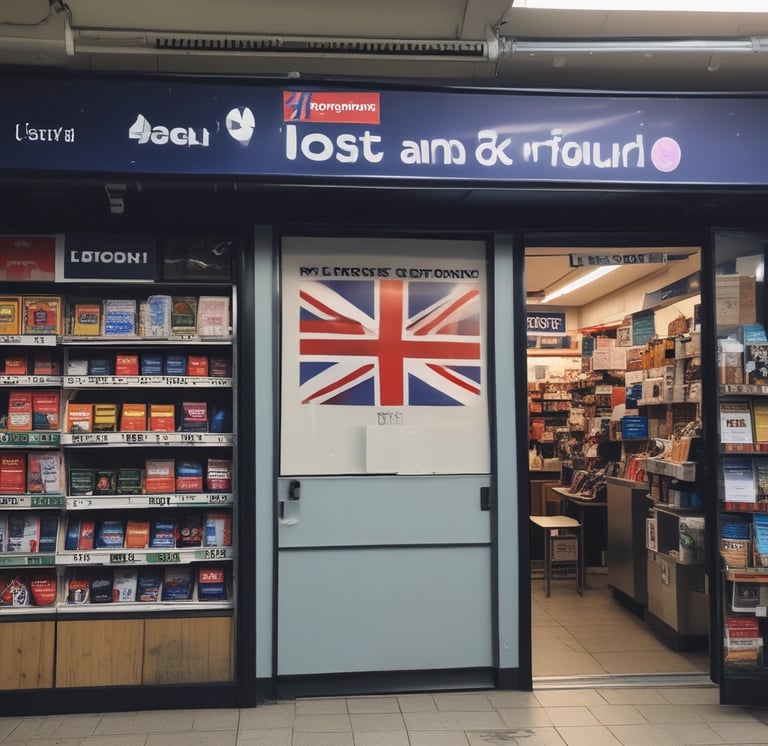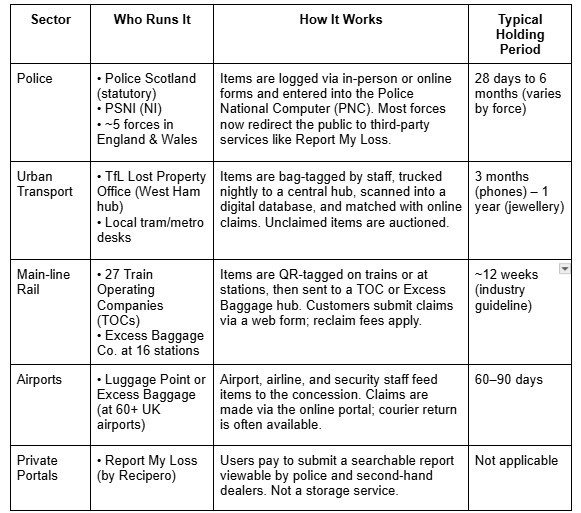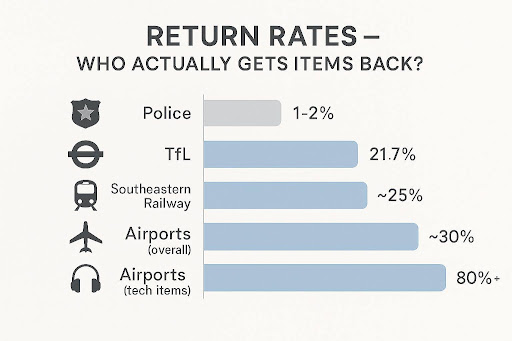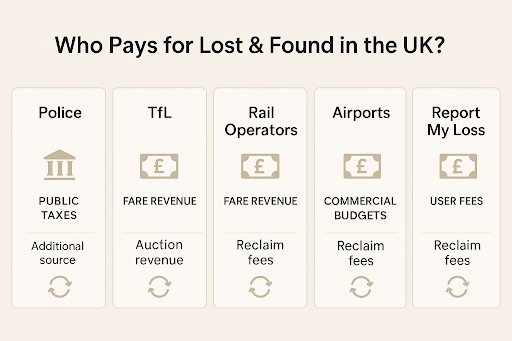A Guide to Lost & Found Services in the UK (updated 2025)
Ever lost something? This guide explores the multifaceted landscape of lost-and-found services in the UK, highlighting how technology, grassroots communities, and institutional frameworks each contribute to safeguarding the return of lost belongings. Lost & Found agencies and services found in the UK today are highlighted along with proactive tagging options for recovery efforts.
Lost-Is-Found Team
8/8/20254 min read


Quick Facts UK: What's lost and recovered
3,285 items are lost per year per UK city (Uber stats, 2025).
UK adults on average spend around five grand over a lifetime replacing lost items.
To break it down:
Hundreds of items are lost per year per person in the UK: equating to roughly 60 hours of searching per year and cumulatively worth over 150 days of one’s life spent searching
IOSR Journals | The SunThe average UK adult may spend around £4,480 over their lifetime replacing lost items
SWNS DigitalUK airports handled around 62,900 lost items between August 2023 and August 2024, with travellers spending on average £154 to replace lost essentials
Confused.comModern solutions include GPS, Bluetooth Trackers and NFC tags that boost recovery chances.
Around the globe, the quest to reunite lost belongings with their owners takes myriad forms: from technologically advanced tracking systems to compassionate grassroots initiatives. In bustling metropolises such as Tokyo and New York, Bluetooth tags and dedicated apps are commonplace today; in rural communities across India and South America, local networks and message boards play a critical role. Europe, too, embraces diverse solutions: France implements dedicated municipal lost-and-found databases, while Germany often relies on stringent reporting protocols. Yet amid this tapestry of global practices, the UK stands out for its uniquely layered ecosystem: from national platforms accessible by all police forces and recognised by insurers, to community-driven networks and transport authority systems (such as TfL’s NotLost and volunteer programs such as the National Ring), to BBC TV programs- the British methods exemplify a seamless melding of digital convenience, local participation, and official infrastructure.
How UK Lost Property Systems Work
At times your device may go out of Bluetooth range if you lose them in places like a train or in the street for example. If that happens in the UK, here’s how lost & found works across the UK (by sector):


You can file a report with a recovery service like ReportMyLoss. All UK police forces can access it. It’s helpful for insurance too and costs about £5 to £6 (some local police may cover it).
Community Power: Local Groups & Online Networks
If your item is lost in a neighbourhood, Facebook groups, Nextdoor, or UK-wide platforms like Lostbox can help. Post a description of what you lost and where and when you lost it, but leave out a small detail (like a unique sticker or case) that only the owner would know so that nobody else can claim it as theirs.
Is the item with Bluetooth?
If you have a Bluetooth headset or speaker, try playing something on its previously connected device. If it is still connected you may hear a faint hum, which can help find its location. If an item has Bluetooth or is tagged with a Bluetooth tracker the recovery can be easier.
What If You Don’t Have a Tracker Attached?
What many people don’t realise is they should have tagged an item, before they manage to lose it. Not everything is compatible however for Bluetooth tags (size, price, battery life of BLE tags are OK for certain items, say your car keys or backpack, but what about for your wallet, passport or those pesky glasses?) and that’s where NFC tags and QR-code stickers could do the trick for you.
These are super thin stickers, which you can put on your phone, wallet, or lunch box, and which you may also put on a child’s backpack. If someone comes across your lost item, they can use any smartphone to tap it, and your info appears (but private details are protected).
You can get these at Smart-Tag. Setup is a quick process that also gives you the control of what info to put in such as name, number, message, and even a reward offer.


Final Thoughts: Why Wait Till It’s Lost?
Losing out on what is valuable is very frustrating. What makes the difference is how well prepared you are. Of all types of personal items, from a Bluetooth device to a key-chain to your child’s school bag, there is a better way of protection for your possessions today.
Want simple peace of mind solutions?
Find NFC stickers or AirTag accessories at Smart-Tag
Need help coordinating a return effort for a lost item? Sign up at Lost-Is-Found and connect with an expert support network.
To conclude, Lost & Found agencies exist in most ports including airports around the world. If someone hands in your item they may store it for a limited time. The biggest challenge lies in identifying the legit owner and coordinating a return. These agencies are funded in various ways- from tax payer monies to ticket fare allocations toward continued operations of such services. In this article, we have provided the UK example. We have also sign-posted simple proactive solutions those in Britain can rely on today. We hope this helps you plan better and if you need some assistance in recovery, contact us.


connect
Join us to recover your lost items easily.
trust
help
support@lost-is-found.org
+441234567890
© 2025. All rights reserved.
